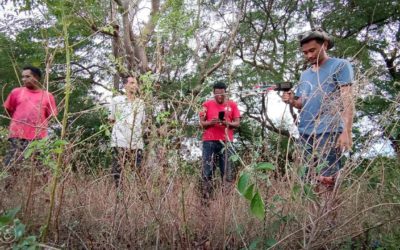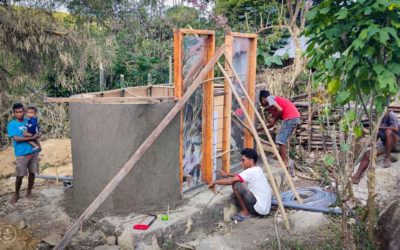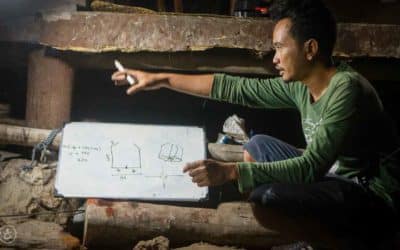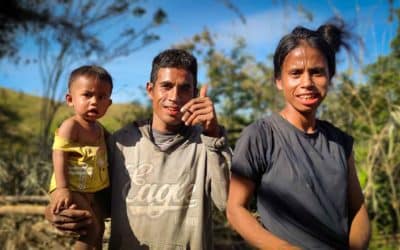As part of the #waterconnections project, the Fair Future and Kawan Baik foundations have received several requests for help related to socio-medical projects, including a significant number related to access to clean water from local communities and rural villages. Some of these requests come to us directly from local authorities in East Sumba. For this Kambajawa – Praiwora project, Fair Future received this request now from our friend, the Regent of East Sumba, Mr Khristofel Praing. Kawan Khris asked us to see what we could do to help this village and these families in Praiwora who have not had access to water for almost five years.
Illness often begins long before someone arrives at the hospital. Our campaigns on smoking, waste management, alcohol, and sexual health display straightforward messages across schools and village walls in local languages. Through simple posters, talks, and games, we help protect thousands of children.
Do you know what actions Fair Future is taking to solve the problem of lack of clean water?
The Water Connections program aims to provide fair and safe access to clean water. This initiative not only prevents diseases and reduces health risks, but also sustains lives, decreases infant mortality, and promotes economic prosperity.
The Water Connections category of Fair Future Foundation shares our vital work in improving clean water access and sanitation in ultra-rural Indonesia. Through wells, reservoirs, and water-saving initiatives, we help communities secure reliable, safe water. These stories highlight how our water projects improve health, reduce disease, and bring new hope to children and families living in the most remote and challenging environments.
Clean water and sanitary facilities
Building healthy sanitation facilities in rural areas
We are building safe and healthy sanitation facilities for these reasons: Ending defecation in the open rather than in toilets will have “transformational benefits” for the most vulnerable people in East Sumba. Open defecation is when people defecate in the open -for example, in fields, forests, bushes, lakes and rivers rather than toilets. We find that of the hundreds of thousands of people who practice open defecation, 91% live in rural areas. An increase in the population of the regions in which we work leads to a localized increase in open defecation.
Building a 6,500-litre Ferro-cement tank
Building a water storage tank is something simple but complicated at the same time. Working day and sometimes night too, sleeping under challenging conditions, eating little and walking a lot… This is the life of the Fair Future and Kawan Baik teams in the field, every day for months with the support and unconditional support of the villages where we are setting up a new program. We are very involved in all the constructions, be it the reservoirs but also the healthy sanitary installations, the water connections, the filtration systems, and so many other things which, put together, create infrastructures which make them more useful, simpler life.
Clean water and sanitation for a magic trick
For a few months -thanks to the Water Connections program–, the families are feeling healthier, happier and have much more energy. The villagers, who are 100% farmers, are much less sick, and they are in better health. Vegetable gardens are created, and an economy is built. Women and children spend much less time fetching water from wells far from homes. As a result, children spend more time in school, and adults have more time to do things they couldn’t do before. On the other hand, water remains the absolute priority of each of the 250 families of #mbinudita, well before everything else! Today, we are building healthy sanitary facilities for the village and the villagers. Like all other families living in ultra-rural areas, people have never had access to toilets or a place to bathe or do laundry.
For the past two months, we have been on the Mbinudita site
Our teams have been on the SD Mbinudita site for two months for the Water Connections project, clean, safe and clean water for all. The Mbinudita school is the centre of life for an entire region, where more than 2,500 people live, divided into nearly 250 families, the vast majority of whom are children. The social, technical, medical and logistics staff and documentalists have been working for several months on the realization of this unique project. The Water Connections program connects groups of houses and an entire population to clean water connections, sometimes houses more than three kilometres apart from each other. This uses buried pipes, 6500-litre tanks, healthy sanitary facilities, and our boreholes. The innovation is that we mainly use gravity, iron and cement for the construction.
We carried out our first deep drilling with our own machine
Until last week, the 264 students of this school in East Sumba had no water in their school. As you can imagine, this posed unexpected sanitary problems for all the children, the teachers and the houses in the surrounding area. Fair Future has therefore decided to drill a deep well at the back of the school, and we have, thanks to our detection tools, found clean and clear water at a depth of almost 40 meters. A massive change for this community and the people who live nearby. Indeed, they will also be able to come and get water from this new deep well.







